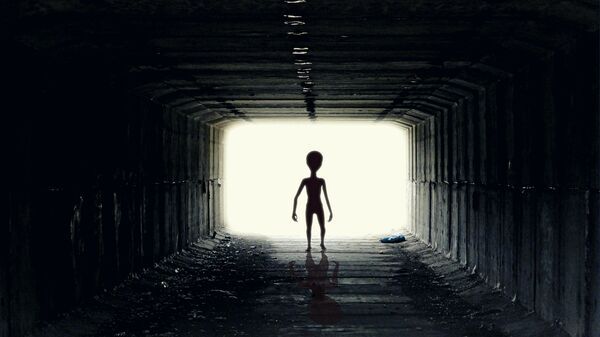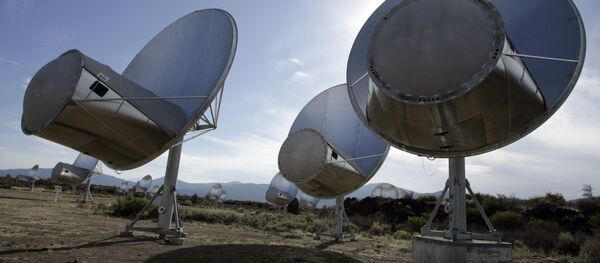Is there life out there? Many wonder about this, but there are different opinions as to the likelihood of such a thing. But there's another important question besides whether there is life out there. If there is contact between Earthlings and aliens, what would that encounter look like?
Sociologists Michael Schetsche and Andreas Anton have tried to answer these questions in their book "The Alien Society. Introduction to exosociology".
Sputnik has spoken to Michael Schetsche, one of the authors of the study.
Inhabited Planets and Life in Harsh Conditions — the Causes of Eexosociology
According to Schetsche, the issue of extraterrestrial civilisations has become more important in recent decades for two reasons. On the one hand, humankind has come to know much more about habitable planets.
"We've known for about 20 years that the planets in the Universe are scattered everywhere. According to current estimates, we have 200-300 billion planets in our galaxy", the scientist said.
READ MORE: Skeleton With 'Alien' Egg-Shaped Skull Discovered in Southern Russia (VIDEO)
On the other hand, research has shown that life is an "extremely robust" phenomenon. "Throughout the world, where appropriate conditions exist, different forms of life develop". That's why life may well exist in the Universe, despite the sometimes very severe conditions. "Nowadays, our scientific conceptions of the Universe say that it's very probable that there are other intelligences besides the human, and that means that we could find them someday", Schetsche said.
Signals, artefacts and direct contact
The sociologists used certain futurology methods and created a series of scenarios, that is, they determined some basic parameters and different scenarios of a meeting between humans and aliens. According to the scientists, there are three possible scenarios.
- Remote contact. In this scenario, the Earth would receive a distant signal from an extraterrestrial civilisation. It is currently the only research scenario of the American SETI, which is searching for extraterrestrial intelligence. Schetsche considers that this research has defects because contact can also be made in other ways.
- Indirect contact through an artefact. In this scenario, we would contact aliens in the Earth's vicinity when discovering some ancient probe or suspicious space debris. It would be artefacts that demonstrate the presence of an extraterrestrial entity that would have visited the solar system long ago.
- Direct contact. In this scenario, we would come into contact with extraterrestrials directly, with a flying object, containing aliens. It's not been ruled out, however, that such a spacecraft could be directed by artificial intelligence or by some type of machine. What's more important here is that through this there could be communication with an alien civilisation.
Most Likely Contact Will be Dangerous
Since we don't have any examples of extraterrestrial civilisations available for research, we must make use of historical analogies that have occurred on Earth when more advanced civilisations have contacted with other "less developed" ones, Schetsche explained. It is what is called "asymmetric cultural contact".
"The conquerors represented "the most technologically powerful civilisation" and repressed the representatives of the weaker civilisation", the sociologist recalled.
We should also remember that, in those cases, the meeting between both cultures always had negative economic, political, and religious consequences for the weaker civilisation, which was not capable of "introducing new knowledge into its own conception of the world", he said. In the end, all this led to the destruction of that civilisation.
As for the artefact scenario, it also raises some concern as the discovery of extraterrestrial technology in the asteroid belt, for example, would likely set in motion a race between states and corporations seeking to seize the technology. These clashes could even develop into wars.
"We fear that we would face rather negative consequences", the exosociologist concluded.
READ MORE: Dark 'Shadow' Spotted Over Earth Spawns Alien Planet Conspiracy Theories
Michael Schetsche's interest in this kind of research stems from two reasons. On the one hand, he himself had almost become an astrophysicist, but then "decided against it in politically turbulent times" and became a sociologist. On the other hand, he is one of the students of the Russian-born Ossip Flechtheim, who is said to have founded the German branch of futurology.
"Futurology has always been a key topic for me. That's why I'm not just asking, what happens now, which is the classic question of sociology; I also wonder what will happen in ten, twenty, or fifty years. Different aspects come into focus. And one of these aspects is the question: what if we were confronted with an extraterrestrial intelligence?" the researcher said.
The views and opinions expressed in this article are solely those of the speaker and do not necessarily reflect those of Sputnik.






